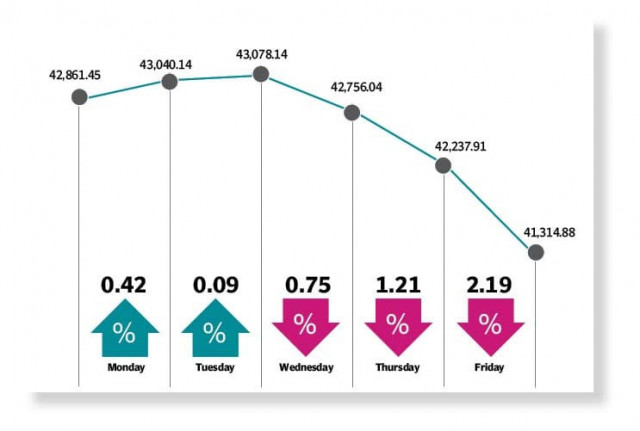Bears take centre stage, erase 1,547 points
Increase in T-bill yields, surge in oil and electricity prices dent investor interest

Bears took control of the Pakistan Stock Exchange and dominated trading during the outgoing week as jittery investors tried to look for positive cues amid growing concerns over the economic situation in the country.
During the week, T-bill yields went up in the range of 55-75 basis points (bps) in the secondary market, which dented the interest of investors, who feared a further hike in the State Bank’s benchmark policy rate.
The investors were also reluctant to engage in fresh stock purchases on account of a high inflation reading for May 2022 at 13.76% - a 28-month high.
Moreover, increase in petroleum product prices by Rs30 per litre, surge in electricity tariff by Rs8 per unit and decline in foreign exchange reserves greatly dented the investors’ sentiment.
The benchmark KSE-100 index closed the week with a loss of 1,547 points, or 3.6%, at 41,315.
The bourse opened the week on a positive note amid hopes for the resumption of the much-awaited International Monetary Fund’s (IMF) loan programme.
After a brief respite, the situation changed and bearish spell took over the bourse.
Investors further lost hope as the government’s measures to clear the way for the restoration of IMF’s programme, reflected in the decisions to increase petroleum prices and electricity tariff, pushed them to offload their holdings, which led the index to lose more points.
The stock market fell below 43,000 points following the dismal data of CPI inflation, which rose 13.8% year-on-year in May 2022.
“Moody’s downgrade of Pakistan’s credit rating outlook from ‘stable’ to ‘negative’ further fuelled bearish sentiment for the already hesitant investors on the last trading session of the week,” said JS Global analyst Muhammad Waqas Ghani.
“On the news front, the cut-off yields showed an increase of 55-75bps as compared to the previous yields during the T-bills auction held during the week,” the analyst added.
Arif Habib Limited, in its report, said that following the decision to partially remove the subsidy on petrol and diesel and increase in petroleum prices by Rs30 per litre, the market commenced trading on a positive note during the week under review on hopes for resumption of IMF loan programme as these measures were deemed to be a pre-requisite for the approval of seventh review by the Fund.
“As a result, Pakistani rupee staged a recovery against the greenback (closing at Rs197.92 this week),” the report said, adding “however, concerns over inflation (which reached a 28-month high at 13.8% in May) and uptick in government securities’ yields in T-bills auction dampened the sentiment.”
Moreover, the jump in National Savings Schemes’ rate by 150bps and the expected hike in power prices by Rs7.91 per unit set off alarm bells at the bourse.
The last trading session witnessed panic at the bourse after Moody’s Investors Service downgraded Pakistan’s outlook from stable to negative and the government announced another increase of Rs30 per litre in fuel prices, which triggered inflationary concerns.
In terms of sectors, positive contribution came from vanaspati and allied industries (one point).
On the flipside, sectors which contributed negatively included commercial banks (363 points), cement (309 points), fertiliser (163 points), technology and communication (124 points) and chemical (93 points).
Meanwhile, stock-wise positive contributors were Pakistan Oilfields (13 points), Abbott Laboratories (10 points), Mari Petroleum (9 points), SCBPL (6 points) and Colgate-Palmolive (6 points).
However, negative contribution came from Lucky Cement (141 points), HBL (129 points), FFC (87 points), TRG Pakistan (68 points) and Engro Polymer and Chemicals (55 points).
Foreign selling was witnessed during the outgoing week, which came in at $0.42 million compared to net selling of $1.51 million last week. Major selling was witnessed in banks ($4.2 million) and cement firms ($0.4 million).
On the domestic front, buying was reported by individuals ($5.6 million) followed by companies ($5.6 million).
Average daily volumes came in at 210 million shares (down 25% week-on-week) while average daily traded value settled at $30 million (down 23% week-on-week).
Among other major news, July-May trade deficit widened 57.85% to $43.33 billion, forex reserves declined $366 million, urea offtake dipped 10% in May, petroleum sales jumped 18% in 11 months and Japanese bike makers raised prices.
Published in The Express Tribune, June 5th, 2022.
Like Business on Facebook, follow @TribuneBiz on Twitter to stay informed and join in the conversation.



















COMMENTS
Comments are moderated and generally will be posted if they are on-topic and not abusive.
For more information, please see our Comments FAQ